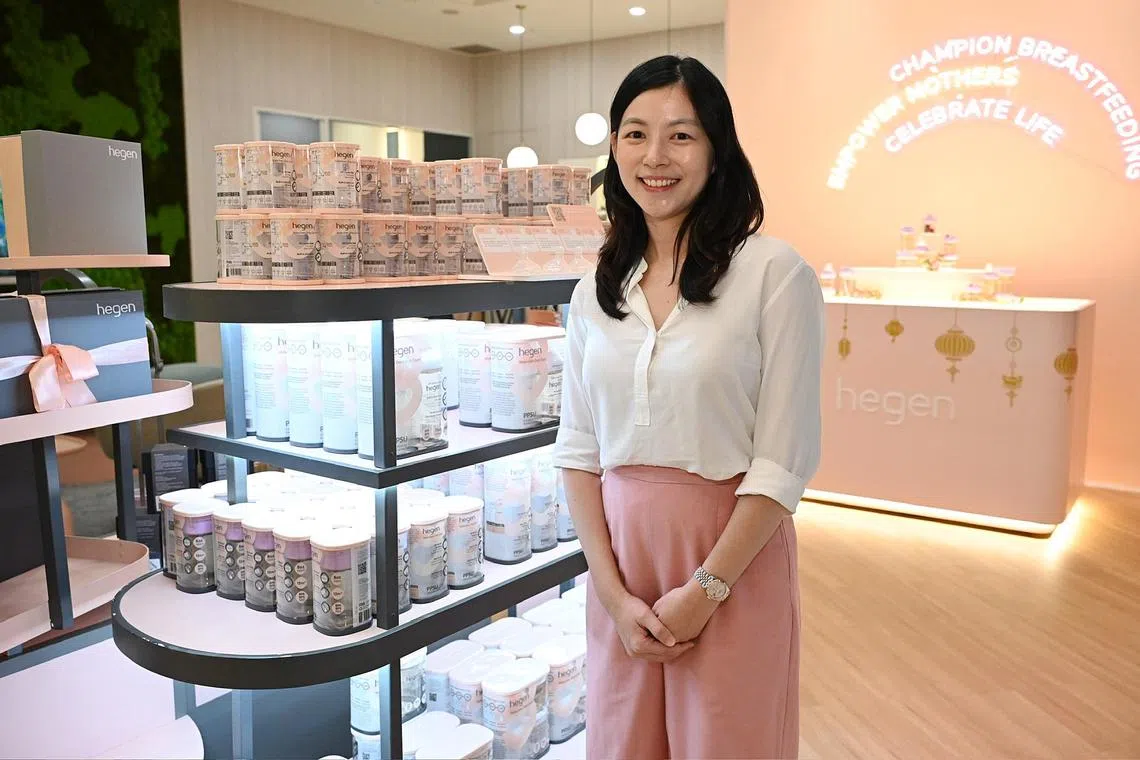Singapore’s total fertility rate hits record low in 2023, falls below 1 for first time
Sign up now: Get ST's newsletters delivered to your inbox

Preliminary estimates indicate a resident total fertility rate of 0.97 in 2023.
PHOTO: ST FILE
Follow topic:
SINGAPORE – The resident total fertility rate (TFR) in Singapore dropped below 1 for the first time in the Republic’s history.
Preliminary estimates indicate a resident TFR of 0.97 in 2023, Minister in the Prime Minister’s Office (PMO) Indranee Rajah said in Parliament on Feb 28.
The persistently low fertility rate comes alongside an ageing population, posing twin demographic challenges for Singapore, she said.
The TFR, which refers to the average number of babies each woman would have during her reproductive years, fell even further from 1.04 in 2022 and 1.12 in 2021.
Ms Indranee gave various reasons for this, including the Covid-19 pandemic disrupting some couples’ marriage and baby plans, and laid out the measures the Government has taken in recent years to support marriage and parenthood.
A TFR of 0.97 places Singapore among those countries with the lowest birth rates globally, with South Korea topping the list with a TFR of 0.72 in 2023.
Singapore’s fertility rate is well below the replacement rate of 2.1 – the level of fertility at which the population replaces itself from one generation to the next.
Like in many other developed countries, falling fertility rates reflect a generational change in priorities, and young people may not even see marriage or parenthood as important life goals, she said.
But it has serious implications for Singapore’s future, she said, adding that countries such as South Korea and Italy are grappling with economic slowdowns and falling wages that are compounded by their low birth rates and the resulting demographic changes.
She said: “With fewer births, we will face a shrinking workforce. It will be increasingly challenging to maintain our dynamism, attract global businesses and create opportunities for the next generation.”
However, she noted that young Singaporeans still aspire to settle down and have children.
In 2023, there were 26,500 resident marriages and 30,500 resident births, she said during the debate on population issues.
However, there were fewer resident marriages and births each year on average over the past five years, compared to the preceding five-year period.
A resident marriage is one involving at least one Singapore citizen or permanent resident (PR), while a resident birth refers to a baby who is born to at least one parent who is a Singaporean or PR.
Ms Indranee also gave an update on a new move to allow elective egg freezing to help women preserve their fertility.
About 200 women have gone for elective egg freezing, which is done for non-medical reasons, since it was allowed in June 2023,
Before the landmark change, women could freeze their eggs only for medical reasons, such as when they had to undergo chemotherapy, which could adversely affect their fertility.
In response to Mr Louis Ng’s (Nee Soon GRC) question on when the additional paid paternity leave will be mandated, she said the Government will mandate this as soon as possible.
From Jan 1, fathers get four weeks of paid paternity leave
The extra two weeks of paid parental leave are on a voluntary basis for now, with employers who are ready to grant this additional leave to be reimbursed by the Government.
She added that the Government is also “actively exploring how to increase paid parental leave”, having studied the leave provisions of other developed countries such as France and Denmark.
It is also exploring other sustainable ways to help parents juggle between work and family commitments, she said.
For example, the Manpower Ministry (MOM) is working with its tripartite partners to develop new Tripartite Guidelines on Flexible Work Arrangement Requests. More details will be shared during the debate on MOM’s budget.
She also highlighted a local company, Hegen, which develops infant care products such as baby bottles, for its family-friendly practices.
Hegen has a raft of flexible working arrangements for its employees, such as working part-time, having staggered hours and working from home. The firm started offering its staff four weeks of Government-paid paternity leave since January 2024.
On top of that, it offers all staff two days of family care leave and two days of mental wellness leave, as well as leave on their birthday, on top of their annual leave entitlement.
Hegen’s founder Yvon Bock said its family-friendly policies have resulted in better retention, as well as increased satisfaction and productivity among its employees.

Hegen’s founder Yvon Bock said its family-friendly policies have resulted in better retention, as well as increased satisfaction and productivity among its staff.
ST PHOTO: DESMOND WEE
Ms Lock Hui Min, 37, senior marketing manager at Hegen, said the company’s family-friendly policies are a big pull factor for her to grow her career with the firm.
She worked part-time after her maternity leave ended in 2023. She is currently back to working full-time but with staggered hours, to have more time to bond with her two children, a two-year-old and a nine-month-old.
She said: “Having flexible working arrangements really helps to ease the mum guilt. Because when your baby is so young, it is really hard to be away from them.”

Ms Lock Hui Min, senior marketing manager at Hegen, 37, said the company’s family-friendly policies are a big pull factor for her to grow her career with the firm.
ST PHOTO: DESMOND WEE
Responding to MPs Patrick Tay’s (Pioneer SMC) and Yip Hon Weng’s (Yio Chu Kang SMC) questions about strategies to achieve Singapore’s desired population outcomes, Ms Indranee said Singapore needs more Singaporeans, and the Government will continue to support Singaporeans in starting and raising families.
She added that Singapore’s low birth rates and ageing population have resulted in slowing local workforce growth.
She added: “Even with immigrants, we do not have enough working locals to support continued good economic growth. We must therefore remain open to a diverse foreign workforce that complements the local workforce.”
In 2023, Singapore granted about 23,500 new citizenships, including about 1,300 to children born overseas to Singaporean parents. About 34,500 individuals also became permanent residents last year.
Ms Indranee said the average number of new citizenships and new PRs granted every year since 2019 is slightly higher than that over the preceding period.
She added that Singapore’s immigration policy is also geared towards the Republic’s future population needs.
For example, in recent years, Singapore granted a higher number of PRs to healthcare workers to support the nation’s growing healthcare needs.
She said: “We continue to maintain a measured and stable pace of immigration, which moderates the impact of demographic trends on the size and age profile of the citizen population.”


